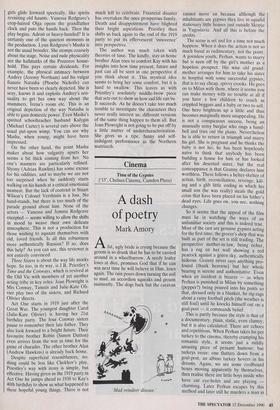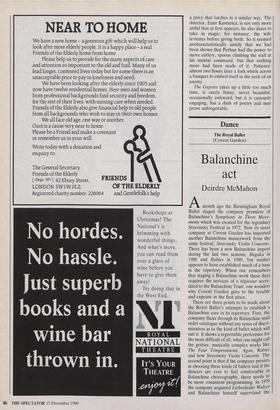Cinema
Time of the Gypsies
('15', Chelsea Cinema, Camden Plaza)
A dash of poetry
Mark Amory
Afat, ugly bride is crying because the groom is so drunk that he has to be carried around in a wheelbarrow. A seedy loafer loses at dice, promises God that if he can win next time he will believe in Him, loses again. The rain pours down turning the soil to mud, an accordion squeaks and groans insistently. The dogs bark but the caravan 'Mad reindeer disease.' cannot move on because although the inhabitants are gypsies they live in squalid stationary little houses just outside Skopje in Yugoslavia. And all this is before the credits.
The scene is set and for a time not much happens. When it does the action is not so much banal as rudimentary, not the point. A gormless youth, Perhan, wants to marry but is seen off by the girl's mother as a hopeless prospect. His wise old grand- mother arranges for him to take his sister to hospital with some successful gypsies, that is to say cheap, spivvy crooks. He goes on to Milan with them, where it seems you can make money with no trouble at all if you have a few children to coach as crippled beggars and a baby or two to sell. Our hero brightens up a little and thus becomes marginally more unappealing. He is not a conspicuous success, being an unusually noisy burglar who rings a hand- bell and tries out the piano. Nevertheless he is able to return in triumph and marry his girl. She is pregnant and he thinks the baby is not his; he has been hopelessly naïve to think that anybody has been building a house for him or has looked after his deserted sister, but the real comeuppance is that Granny declares him worthless. There follows a helter-skelter of action, birth, reconciliation, revenge, kill- ing and a glib little ending in which his small son (he was really) steals the gold coins that have been placed on his father's dead eyes. Life goes on, you see, nothing changes.
So it seems that the appeal of the film must lie in watching the ways of an unfamiliar society and this is indeed true. Most of the cast are genuine gypsies acting for the first time; the grocer's shop that was built as part of the set is still trading. The prospective mother-in-law, being richer, has a rug on her wall showing a red peacock against a green sky, authentically hideous. Granny never says anything pro- found (thank heavens) but her whole bearing is serene and authoritative. Even when an incident is bizarre — as when Perhan is punished in Milan by something (pepper?) being poured into his pants so that, dressed only in a blanket, he zig-zags about a rainy football pitch (the weather is still foul) until he knocks himself out on a goal-post — it commands belief.
This is partly because the style is that of a documentary, plain, static, even clumsy; but it is also calculated. There are echoes and repetitions. When Perhan takes his pet turkey to the cinema, thereby cramping his romantic style, it seems just a mildly amusing piece of peasant humour; but turkeys recur: one flutters down from a goal-post, an albino turkey hovers in his dreams. Again, we see some cardboard boxes moving apparently by themselves, then realise there are little boys inside who have cut eye-holes and are playing — charming. Later Perhan escapes by this method and later still he murders a man in a privy that lurches in a similar way. The director, Emir Kusturica, is not only more artful that at first appears, he also dares to take in magic; for instance, the wife levitates before giving birth. So it seemed uncharacteristically untidy that we had been shown that Perhan had the power to move cutlery, spoons climbing the wall at his mental command, but that nothing more had been made of it. Patience: almost two hours later a fork whirls across a banquet to embed itself in the neck of an enemy.
The Gypsies takes up a little too much time, is rarely funny, never beautiful, occasionally awkward; but it is curiously engaging, has a dash of poetry and may prove unforgettable.



























































 Previous page
Previous page